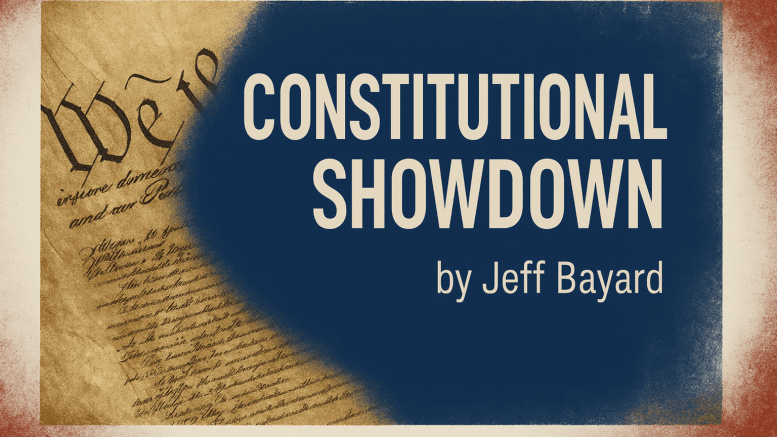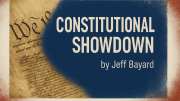The Virginia Christian Alliance continues our Constitutional Showdown series framed from the Christian Worldview and Constitutional originalism, exposing how modern courts twist the framers’ original intent while equipping believers to defend constitutional truth through faithful citizenship and prayer.
Can Schools Override Parents on Matters of Faith? The Supreme Court Just Answered.
Four months ago, the Supreme Court handed Christian parents a constitutional victory that many still don’t fully understand. But here’s what matters most: this is just ONE county out of more than 3,144 counties across America. Montgomery County, Maryland, made national headlines when it eliminated parental opt-outs from LGBTQ-themed elementary school instruction—and parents fought back all the way to the Supreme Court.
The question before the nation: Do government schools have authority to override parents’ religious convictions about what their young children are taught regarding sexuality and gender? Or does the First Amendment still protect parental rights when they collide with state educational mandates?
On June 27, 2025, in Mahmoud v. Taylor, the Supreme Court ruled 6-3 that Montgomery County violated the Constitution. But the real question facing Christian parents today is simpler and more urgent: What’s being taught in YOUR child’s school right now? And do you even know?
The Montgomery County Battle: How It Started
In November 2022, the Montgomery County Board of Education in Maryland approved several LGBTQ-inclusive children’s books as supplemental curriculum for pre-kindergarten through fifth grade. The books included titles like Uncle Bobby’s Wedding (depicting a same-sex wedding), Pride Puppy (YouTube audio version about a puppy lost at a Pride parade), and Born Ready (about a transgender child).
Initially, the school district followed its own “Guidelines for Respecting Religious Diversity” and allowed parents to opt their children out of instruction involving these books. Parents received advance notice, and children could be excused from the classroom during those lessons—the same accommodation provided for other religiously sensitive content.
Then everything changed. In March 2023, less than five months after introducing the books, the school board issued a stunning reversal: no more opt-outs “for any reason.” No more advance notice to parents. Mandatory attendance. The board justified the decision by claiming opt-outs caused “classroom disruption” and that excusing students might expose LGBTQ-identifying children to “social stigma.”
Three families—Muslim parents Tamer Mahmoud and Enas Barakat, Catholic parents Chris and Melissa Persak, and Ukrainian Orthodox parents Jeff and Svitlana Roman—filed suit in May 2023. They argued the policy violated their First Amendment right to direct their children’s religious upbringing. Both the federal district court and the Fourth Circuit Court of Appeals ruled against them, claiming the case didn’t meet the constitutional threshold for religious liberty violations.
The parents appealed to the Supreme Court. And the nation watched.
What Scripture Says About Parental Authority
Before examining the Court’s constitutional reasoning, we must understand the biblical foundation. God’s Word is unambiguous: parents, not governments, bear primary responsibility for their children’s moral and spiritual formation.
Deuteronomy 6:6-7 provides the clearest command: “And these words that I command you today shall be on your heart. You shall teach them diligently to your children, and shall talk of them when you sit in your house, and when you walk by the way, and when you lie down, and when you rise.”
This isn’t a suggestion—it’s a divine mandate. God charges parents with the duty to instruct their children continuously in His truth. The Hebrew word translated “teach diligently” (shanan) means to sharpen, to repeat, to impress deeply. Parents are to shape their children’s understanding of reality according to God’s Word—not delegate that authority to Caesar.
Ephesians 6:4 reinforces this principle in the New Testament: “Fathers, do not provoke your children to anger, but bring them up in the discipline and instruction of the Lord.” The Greek word for “bring up” (ektrepho) means to nourish, to rear, to educate. God commands fathers specifically—and parents generally—to provide biblical instruction. This responsibility cannot be transferred to the state.
Proverbs 22:6 promises: “Train up a child in the way he should go; even when he is old he will not depart from it.” Training (chanak) implies intentional, directed formation of a child’s character and worldview. When schools teach content contradicting biblical truth about sexuality, marriage, and gender, they undermine parents’ God-given mandate.
The principle is foundational: parental authority over children’s upbringing is pre-political. It existed before governments were formed. God ordained the family before He ordained civil authority (Romans 13:1-7). When government schools demand that Christian parents surrender their children’s moral formation to state-approved curriculum, they’re not just violating the Constitution—they’re violating the created order itself.
The Constitutional Framework: Original Intent on Parental Rights
The Framers understood what Montgomery County forgot: government doesn’t grant parental rights; it merely recognizes them. The First Amendment states: “Congress shall make no law…prohibiting the free exercise” of religion. This isn’t permission—it’s a limitation on government power.
Justice Samuel Alito, writing for the 6-3 majority, grounded the decision in Wisconsin v. Yoder (1972), where the Court held that Amish parents could withdraw their children from compulsory high school education because it conflicted with fundamental religious practice. The Yoder Court recognized that forcing Amish teenagers into public high school would “substantially interfere with the religious development of the Amish child” and impose “precisely the kind of objective danger to the free exercise of religion that the First Amendment was designed to prevent.”
Lower courts had dismissed Yoder as applicable only to the Amish—a “sui generis” case tied to their “unique” religious practices. Justice Alito rejected this reasoning decisively: “As if a religion had to be a quaint tourist attraction to receive constitutional protection,” one analyst noted. The Constitution protects all sincere religious convictions, not just photogenic ones.
The Mahmoud Court applied strict scrutiny—the highest level of constitutional review. Why? Because Maryland law makes education compulsory under threat of fines and imprisonment. Parents aren’t simply “forgoing a public benefit”; they face criminal penalties if they refuse to send children to schools that undermine their faith. As Alito wrote, parents shouldn’t have to choose between “public education and raising their children according to their religious faiths when educational alternatives can be prohibitively expensive.”
This aligns with the Framers’ intent. When drafting the First Amendment, they erected a wall protecting religious exercise from government interference. They understood that authentic religious liberty means freedom to live according to conscience—including how parents raise their children. Government schools exist to serve families, not to supplant parental authority on matters of faith and morals.
Applying the Framework: Why Montgomery County Lost
Justice Alito outlined specific factors showing the school board’s policy “substantially interfered” with parents’ religious exercise:
First, the content itself: The books weren’t merely depicting LGBTQ characters incidentally. They were designed—by the district’s own admission—to “disrupt” children’s thinking about sexuality and gender. Teacher guidance documents instructed educators to correct children who expressed traditional beliefs. If a kindergartner said, “He can’t be a boy if he was born a girl,” teachers were urged to respond: “That comment is hurtful.”
Second, the age of the children: These weren’t high schoolers capable of critical analysis. These were pre-K through fifth-graders—ages 4 to 11—at the most impressionable stage of development. The Court noted that young children “love their teachers and implicitly trust them,” making them particularly vulnerable to messages contradicting parental instruction.
Third, the coercive nature: Because Maryland compels school attendance and Montgomery County mandated participation without notice or opt-out, parents faced an impossible choice: violate criminal law by withdrawing children, pay for private school they couldn’t afford, or watch their children receive instruction directly contradicting their faith. The Court recognized this as textbook coercion.
Fourth, the hostile framing: The books didn’t merely present different viewpoints; they characterized biblical beliefs as “hurtful” and “hateful.” As Justice Alito noted, the curriculum suggested “it is hurtful, and perhaps even hateful, to hold the view that gender is inextricably bound with biological sex.” This isn’t neutral education—it’s indoctrination with a clear normative message.
The school board argued it had a “compelling interest” in creating an inclusive environment. The Court didn’t dispute schools’ interest in teaching respect and civility. But administrative convenience doesn’t override constitutional rights. The board’s claim that opt-outs caused “disruption” failed strict scrutiny. As one legal analyst observed: “Translation: parental rights are inconvenient. But inconvenience doesn’t override the Constitution.”
What the Opposition Says—and Why It Fails
Justice Sonia Sotomayor authored a lengthy dissent, joined by Justices Elena Kagan and Ketanji Brown Jackson. Her 38-page opinion warned of “chaos” if schools must provide opt-outs for any curriculum implicating religious beliefs. She argued the majority “invents a constitutional right to avoid exposure to ‘subtle’ themes ‘contrary to the religious principles’ that parents wish to instill.”
Representative Jamie Raskin of Maryland called the decision “cruel” and questioned whether it would allow students to opt out of evolution, history lessons about wars, or classes taught by female teachers—all of which some religions might find objectionable.
These concerns, while understandable, fundamentally misread both the Constitution and the Court’s holding.
First, the Court didn’t create a blanket right to opt out of any content parents dislike. The holding is fact-intensive, requiring analysis of the specific religious beliefs asserted, the nature of the instruction, the age of children, and whether the content is “hostile” to religious beliefs and designed to impose “pressure to conform.” Not every parental objection meets this standard.
Second, there’s a meaningful distinction between exposure to ideas and compelled affirmation. Teaching that some people believe in evolution differs from requiring children to affirm evolutionary theory as truth. Similarly, learning that same-sex marriage exists legally differs from instruction designed to “disrupt” children’s beliefs about marriage and present traditional views as “hurtful.”
Third, the slippery slope argument ignores 250 years of constitutional history. Public schools have long taught controversial content without collapsing into chaos. The Constitution doesn’t require schools to eliminate all potentially objectionable material—only that they provide reasonable accommodations when curriculum substantially burdens sincere religious exercise.
Fourth, Montgomery County itself provided opt-outs initially without the sky falling. The “chaos” argument is disproven by the district’s own prior practice.
The Framers designed the First Amendment precisely for situations like this: when government action threatens to undermine parents’ ability to raise children according to religious conviction, the Constitution sides with parents—not bureaucrats who find accommodations “inconvenient.”
The Spiritual Battle Behind the Legal Battle
As Christians, we must recognize what’s happening beneath the surface. Ephesians 6:12 warns: “For we do not wrestle against flesh and blood, but against the rulers, against the authorities, against the cosmic powers over this present darkness, against the spiritual forces of evil in the heavenly places.”
The Montgomery County case isn’t ultimately about five children’s books. It’s about who shapes the next generation’s understanding of reality: Will children learn that God created male and female in His image (Genesis 1:27), or that gender is fluid and self-determined? Will they understand marriage as a covenant between one man and one woman (Genesis 2:24, Matthew 19:4-6), or as whatever adults choose to define it?
Satan’s strategy hasn’t changed since Eden: “Did God actually say…?” (Genesis 3:1). He targets children because they’re vulnerable, impressionable, and represent the future. When schools teach kindergartners that biological sex doesn’t determine gender, they’re not just presenting an alternative viewpoint—they’re attacking the created order and sowing confusion where God established clarity.
2 Timothy 3:16-17 reminds us: “All Scripture is breathed out by God and profitable for teaching, for reproof, for correction, and for training in righteousness, that the man of God may be complete, equipped for every good work.” God’s Word provides the standard for training children. When schools contradict that standard, Christian parents must stand firm—even if it means litigation, even if it means sacrifice, even if it means swimming upstream against cultural pressure.
This isn’t about hatred toward anyone. Christians are commanded to love all people, including those identifying as LGBTQ (Matthew 22:39). But love doesn’t require affirming lies. We can treat all people with dignity and respect while maintaining that God’s design for sexuality and gender is good, true, and beneficial. The Mahmoud parents didn’t seek to ban books or silence other perspectives; they simply asked for the right to control when and how their young children encountered content contradicting their faith. The Constitution granted that right.
What This Means for You: Action Steps for Christian Parents
Here’s the uncomfortable truth: Montgomery County is just one of 3,144 counties in America. Right now, at this moment, similar content may be in your child’s classroom, school library, or county library system—and you might have no idea.
Following the Mahmoud ruling, Montgomery County approved 58 opt-out requests from 43 families. But how many Christian parents in that county still don’t know what their children are being taught? How many haven’t investigated? How many assume their schools are safe?
The Supreme Court gave you a constitutional weapon. But weapons are useless if left in the armory. Here’s what you must do:
Investigate Your School District:
- Submit public records requests – Use your state’s Freedom of Information Act (FOIA) to obtain complete book lists for your child’s grade level and school library catalog
- Visit the classroom – Schedule time with your child’s teacher to review books available during “independent reading time” and supplemental curriculum materials
- Attend school board meetings – Ask direct questions about LGBTQ-inclusive curriculum, notice policies, and opt-out procedures
- Review online resources – Check if your district posts curriculum materials online; many don’t, which should raise red flags
Check Your County Library System: Search your library catalog for these specific titles from the Mahmoud case:
- Uncle Bobby’s Wedding by Sarah S. Brannen
- Pride Puppy by Robin Stevenson
- Born Ready: The True Story of a Boy Named Penelope by Jodie Patterson
- Prince & Knight by Daniel Haack
- IntersectionAllies: We Make Room for All by Chelsea Johnson
If these books are in your library’s children’s section, similar content may be in your schools.
Document Everything:
- Screenshot book titles, descriptions, and library locations
- Record school board meeting responses (video if permitted)
- Save all written communications with teachers and administrators
- Photograph classroom materials when legally permitted
- Create a paper trail showing you’ve requested information and accommodations
Know Your Rights Under Mahmoud:
- Schools must provide advance notice before using content that substantially interferes with religious upbringing
- You can request opt-outs based on sincere religious conviction
- Districts cannot deny requests merely because accommodations are “inconvenient” or “disruptive”
- The burden is on schools to prove a compelling interest that survives strict scrutiny
- Criminal compulsory education laws cannot coerce you into choosing between your faith and your child’s public education
Connect with Legal Resources: If your school denies your request or retaliates, contact these organizations immediately:
- Becket Fund for Religious Liberty (represented the Mahmoud parents): becketlaw.org
- Alliance Defending Freedom: adflegal.org
- Liberty Counsel: lc.org
- First Liberty Institute: firstliberty.org
Prayer and Community Action: Don’t fight alone. Galatians 6:2 commands: “Bear one another’s burdens, and so fulfill the law of Christ.”
- Form prayer groups specifically focused on your local schools
- Connect with other Christian parents in your district
- Attend school board meetings together—strength in numbers matters
- Support pastors and church leaders willing to address these issues publicly
- Vote in school board elections (most Christians don’t, which is why these boards often go unchecked)
Follow National Developments: The Mahmoud case was remanded to lower courts for final resolution. Implementation details are still being worked out. Stay informed by:
- Subscribing to alerts from the legal organizations listed above
- Following Mahmoud v. Taylor updates on SCOTUSblog (scotusblog.com)
- Joining parental rights advocacy groups in your state
- Connecting with other Christian parents through church networks
The Stakes: Why This Battle Matters
Make no mistake: this is a battle for the next generation’s souls. Proverbs 23:26 says: “My son, give me your heart, and let your eyes observe my ways.” God commands parents to capture their children’s hearts for His truth. Government schools increasingly work to capture those same hearts for a different message.
Some will call this alarmist. They’ll say you’re overreacting, that these are just “inclusive” books promoting “kindness.” But words matter, and so does timing. There’s a reason these books target pre-K through fifth grade—ages when children’s worldviews are most malleable, when they trust authority figures implicitly, when they haven’t yet developed the critical thinking skills to evaluate competing truth claims.
The Supreme Court recognized this. Justice Alito noted that the Romanian parents feared their son, who “loves his teachers and implicitly trusts them,” would be particularly vulnerable to instruction contradicting their beliefs. Young children don’t have the cognitive capacity to compartmentalize: “Teacher says this is true, but Mom and Dad say it’s false—I’ll figure that out later.” They integrate what they’re taught. And if schools teach that biological sex doesn’t determine gender, that same-sex marriage is equivalent to biblical marriage, that people can be “born in the wrong body”—children will absorb those messages as truth.
Matthew 18:6 contains one of Jesus’s sternest warnings: “But whoever causes one of these little ones who believe in me to sin, it would be better for him to have a great millstone fastened around his neck and to be drowned in the depth of the sea.” God takes threats to children’s faith seriously. So should we.
The Hope: God’s Sovereignty and Our Responsibility
The outcome of Mahmoud v. Taylor is encouraging, but our hope doesn’t rest on Supreme Court decisions. Psalm 127:1 reminds us: “Unless the LORD builds the house, those who build it labor in vain. Unless the LORD watches over the city, the watchman stays awake in vain.”
God is sovereign over nations, courts, and school boards. He remains on His throne regardless of legal outcomes. But sovereignty doesn’t negate responsibility. God commands us to defend the vulnerable, to stand for truth, to train our children in righteousness. The Mahmoud victory is a tool God has provided—but tools require wielders.
Psalm 78:4-7 provides the long-term vision: “We will not hide them from their children, but tell to the coming generation the glorious deeds of the LORD, and his might, and the wonders that he has done…that they should set their hope in God and not forget the works of God, but keep his commandments.”
This is why we fight: not just for our children, but for their children, and their children’s children. The faith must be transmitted from generation to generation. When schools undermine that transmission, parents must push back—not in anger, but in faithful obedience to God’s command to shepherd the next generation toward Christ.
Conclusion: Parents, Not Bureaucrats, Hold Authority
On June 27, 2025, the Supreme Court declared what Scripture established millennia ago: parental authority over children’s upbringing is not subject to bureaucratic veto. When government schools collide with religious conviction, the Free Exercise Clause protects families from coercion.
But this victory means nothing if Christian parents remain unaware of what’s being taught in their own communities. Montgomery County is one of 3,144 counties. One school district among thousands. The question isn’t what happened in Maryland four months ago—the question is what’s happening in YOUR school today.
The Framers designed the Constitution to protect religious liberty. They understood that authentic freedom requires limiting government power over families. Justice Alito’s majority opinion vindicated that design. As he wrote: “The right of parents ‘to direct the religious upbringing of their’ children would be an empty promise if it did not follow those children into the public school classroom.”
For Christian parents, the path forward is clear:
- Investigate what your children are being taught
- Assert your constitutional rights when necessary
- Document everything for potential legal action
- Connect with other faithful parents and legal resources
- Pray for wisdom, courage, and God’s protection over the next generation
The government doesn’t own your children. You do.
The Supreme Court has confirmed it. Now you must defend it.
Toughtful and respectful dialogue from all viewpoints. Comments must remain civil, relevant, and free of profanity, personal attacks, or mockery of Christian faith. Disagreement is allowed—disrespect is not.
Jeff Bayard is a devoted Christian, husband of 45 years, father of two, grandfather of three, and content manager at Virginia Christian Alliance, where he champions biblical values, conservative principles, and constitutional truths through the Constitutional Showdown series.




